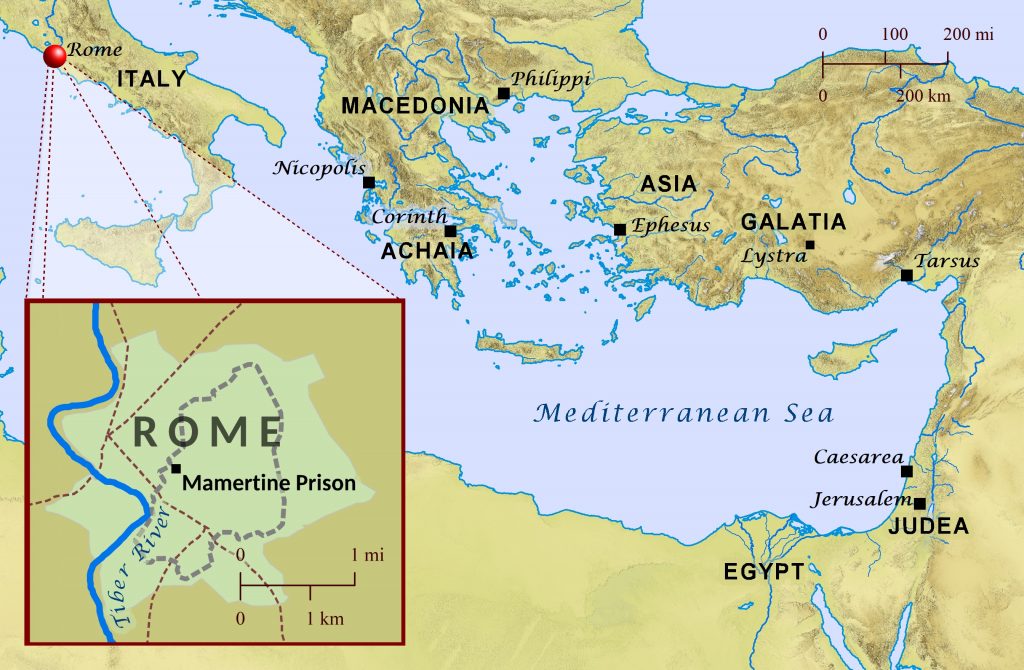BMM BibleMapper.com Maps:

Paul Is Imprisoned for the Gospel
As the book of Acts attests, Paul was no stranger to imprisonment, and he catalogued his incarcerations among his many credentials of suffering that affirmed his legitimacy as an apostle to the Corinthians (2 Corinthians 6:4-5). The first mention of Paul being imprisoned is when he and Silas were arrested in Philippi after exorcising a spirit of divination from a slave girl (Acts 16). Paul’s actions angered the girl’s owners, since the men were no longer able to make money off of the girl’s fortune telling abilities. Later in his letter to the Corinthians, Paul notes that he had already suffered multiple imprisonments (2 Corinthians 11:23), making it clear that not all of Paul’s imprisonments and other sufferings were recorded in Scripture. The next imprisonment explicitly mentioned in Scripture is when Paul was arrested in the Temple in Jerusalem at the end of his third missionary journey (Acts 21:27-34). Soon after this Paul was sent to Caesarea on the Mediterranean coast, where he remained in prison for two years (Acts 23-26; see “Paul Is Transferred to Caesarea” map). This may be where Paul penned the letters commonly known as the Prison Epistles (Ephesians, Philippians, Colossians, and Philemon). At the end of this time Paul appealed his case to Caesar and was sent to Rome, where he spent another two years under house arrest awaiting his trial before Caesar (Acts 28:16-31). If Paul did not write his Prison Epistles while he was at Caesarea, then it is likely that he wrote them from Rome during this time. The next time we hear of Paul being imprisoned is likely several years later in his second letter to Timothy (2 Timothy 1:8-17; 2:9; 4:9-21). Though it is not certain, the tone of Paul’s writing during this time of imprisonment, which seems markedly more somber than the optimistic outlook he seems to have about his incarceration during the writing of the Prison Epistles (e.g., Philippians 1:21-26; Philemon 1:22), suggests that this incarceration was not the same as his house arrest. If so, then it is possible that between his first and second incarcerations in Rome Paul fulfilled his intention to travel to Spain to continue spreading the gospel (Romans 15:22-28). Just prior to his second incarceration in Rome, Paul had informed Titus that he planned to spend the winter in Nicopolis northwest of Achaia and asked him to meet him there (Titus 3:12). Perhaps it was around this time or soon after that he was arrested once again and brought to Rome. Paul’s ultimate fate is not noted in Scripture, but tradition (Clement, Dionysius, Eusebius, and Tertullian) attests that this final imprisonment of Paul took place at what is now called Mamertine Prison. During Paul’s time this was the only prison in Rome and was called simply “the Prison,” and it was not typically used for long term incarceration but rather for holding those awaiting imminent execution. There, during the reign of Nero, Paul met his earthly death by the sword and was received into eternal life by his loving Savior, whom he had served so long.

